#hp canon analysis
Explore tagged Tumblr posts
Photo
poor Draco 😭😭😭
One day he'll meet his soulmate Dudley, and they'll both be so happy together 😍
Does anyone else ship Drudley?
Reblog if you agree that both our boys deserve happiness!
Let's Make Drudley Great Again!
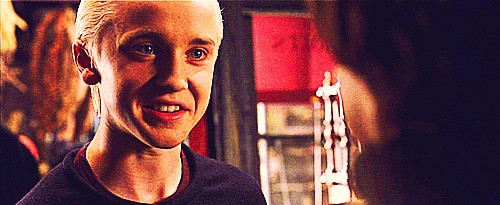
#draco malfoy#harry potter#dudley dursley#pro draco malfoy#drudley#draco malfoy fanfic#draco malfoy ships#draco malfoy fanfiction#draco#malfoy#dursley family#petunia dursley#vernon dursley#lucius malfoy#narcissa malfoy#narcissa x lucius#draco lucius malfoy#draco abraxas malfoy#hp#hp fandom#harry potter prompts#hp ships#hp ship wars#hp rare pairs#harry potter rare pairings#hp canon fan#hp canon analysis#ship manifesto#draco malfoy fanart#dudley dursley fanart
429K notes
·
View notes
Text
i would talk about harry potter on here but no one agrees with my headcanons i fear
#rose rambling#mostly bc i hc like 90% of the main cast as poc - neurodivergent - etc#mixed/arabic harry potter.... black hermione.... dyslexic ron.... autistic luna lovegood + neville longbottom.... the list goes on...#they're also all queer in some way#i enjoy harry potter not in the canon way but in the fanon way#GOD does anyone want to hear my character analysis'#i could write an entire essay on why draco (a literal child!!) shouldve been redeemed instead of snape (incel nice guy)#like draco is actually such a nuanced character#hes not an innocent sweetheart hottie whos done no wrong (tiktok characterization) but he's not like. fucking. idk. satan#i think he deserved redemption is what im saying#more than snape anyway#im more of a marauders person too#SIRIUS BLACK I LOVE YOU SIRIUS BLACK#i love them all#hp is precious to me in a “ive been obsessed with it since my formative yesrs and it is a comfort pieve of media” way#also this has to be said#fuck dumbledore
43 notes
·
View notes
Text
I find it hilarious when people are like "They're just a morally grey character, antis write negative analyses because they can't handle it and need to have the moral high ground. I bet if you read classics like Dostoevsky it'd blow your mind because everyone is flawed there." Honey, I've read Dostoevsky in original and let me tell you, the character you're defending is still ✨️a piece of shit✨️.
Firstly, I don't understand why everyone and their dog is jumping to Dostoevsky when they decide to start reading classics and gain a superiority complex after reading a couple of his books 💀. I'd start with Pushkin and Chekhov and then move onto him, Tolstoy, Gogol, etc. Secondly, almost all my favourite fictional characters are morally grey and even if I don't like some, I find their arc fascinating. But when someone writes long, detailed analyses and supports their claims with facts, it means they have a point and that "negative light" they write that character in, is just casting light on them and their shitty actions. 😀
All the detailed anti analyses I've read clearly state that the author appreciates the well-rounded, flawed character but criticizes their person, or that the author feels like the character should be held accountable by the fandom for what they truly are. Also, we're allowed to hate a character if they're a bully, sexist, racist, etc. Because those are real-world problems that resonate with us, even if the character is well-written and is actually morally grey. No one is saying we can't handle their moral greyness and duality. Sometimes the piece of shit is likable, sometimes not. And even then, there's a huge difference between "this character screws up a lot and is selfish" and "this character was a nazi who enjoys bullying children". If you truly accepted the character as they are with their "moral greyness", you wouldn't be pulling out your hair every time someone writes what they actually did.
I've also noticed that these character defenders pull the "moral greyness" card out to justify their favs, but will nitpick other characters' actions and exaggerate their every past screw-up. What happened to accepting the flaws? 🧐
#i've seen lots of posts like this this is not a dig at a specific person#anti snape#anti snily#pro james potter#pro lily evans#harry potter#harry potter analysis#james potter#lilly evans#harry potter fandom#pro sirius black#canon marauders#canon sirius black#hp fandom#anti jkr#anti jk rowling#hard life of a fan#fandom complaints#fandom commentary#classic books#fyodor dostoevsky#sirius black
13 notes
·
View notes
Text
I’m just gonna say this once and I’m not going to repeat myself, ‘cuz the amount of people who shit at Dumbledore and the Hogwarts staff for this is irrational
The reason Harry didn’t get a teachers visit at first like other muggle-born/muggle-raised kids do, and instead was sent letters was because THEY ALL THOUGHT HE ALREADY KNEW! We see how Hagrid reacts when he hears that Harry doesn’t know anything and we are told that the Dursleys didn’t tell Harry on purpose even though they were supposed to
Everyone thought that Harry already knew about the Wizarding World, so the only missing thing was to send him his letter. About Hogwarts. Which he should have known about because the Dursleys were supposed to explain it to him.
Hermione was muggle-born into a non-magical family , her parents were dentist. Nobody there knew anything about magic. She had a teacher visit to gently introduce her and her parents to the Wizarding world.
Tom Riddle was muggle-raised. He was born to a wizard but he didn’t have any idea about it because he was raised in a muggle environment where nobody knew about magic. He has a teacher visit to explain and introduce the Wizarding World to him.
But the Dursleys ( mainly Petunia ) knew about the existence of magic. Knew about the Wizarding World. And they chose to not tell Harry against what Dumbledore asked them for.
#harry potter#hp fandom#hp#harry potter blog#hp blog#fandom culture#fandom things#harry potter movies#harry potter fandom#harry potter books#petunia dursley#dursley family#albus dumbledore#professor dumbledore#hp analysis#harry potter analysis#canon compliant#analysis#hp books#hp movies
53 notes
·
View notes
Text
OKAY IM A BE REAL- IDC IF ITS UNPOPULAR
I was as pissed as any that the director of "Goblet Of Fire" left out so much shit from the book- shit that imo, were kinda key & could have been film adapted?? Like S.P.E.W., (like just even a mention come on), Harry giving away his winnings & arriving to The Burrow- I get it, the World Cup scene would have been weird to film, but they could have at least shown the movie starting at The Burrow & included some scenes??
Besides the missing scenes and the fact I 100% think the director fucking ✨sucked✨ in this movie & shouldn't have been trusted with the (now 3rd) highest grossing franchise of all time, I dislike how much hate this movie gets in a specific sense- all points are fair, but I can't handle them leaving out a key thing Goblet Of Fire did right.
❗IT GAVE LIFE TO THE GOLDEN TRIO/PEERS AS TEEN CHARACTERS THAT PREVIOUS FILMS HADN'T YET- SPECIFICALLY PUBERTY (i know the books don't really feature what im gonna go into until book 4, but just hear me out)
like idk what your guys's situation in your area is, but from 12-14 where I am, those are pivotal years when it comes to dating, friendships and overall unbalanced emotions due to growing up/puberty
Apart from the weird ass shots/scenes the director chose (focusing in on the Veela- underage students- asses???) I really enjoyed him/the team making them truly seem like teenagers-
⚡first, the deleted scenes: a longer Weird Sisters performance, Ron's hilariously confused look while he sits in the courtyard with Harry & they witness a Durmstrang Student ask their peer out, Harry stumbling on two students "shaking a carriage" then Snape catching them as well.
⚡Then, the kept scenes: Harry and Ron being awkward in finding a date, dancing lessons, Hermione rolling up in something the boys have never seen her in before & looking excited and nervous, Hermione's anger at Ron being a dick that night, Harry asking out Pavarti as a last resort which was showing he obviously couldn't go alone re: teenage mortification, Ron being a little bitch, Hermione getting annoyed at them both for being little bitches and Neville coming back from the ball- then the "boys..." line of disbelief Hermione gives when Ron and Harry make up points to the fact by this age, girls are experiencing the confusion of trying to figure out how a boy's brain works.
Like honestly, despite Harry/Cho in the OOTP film, I didn't really feel the vibes of teenage angst. It wasn't until HBP until I actually felt they were going through The Motions™️of being young adults.
!!!And its so important a piece to include because they are!!! like I haven't read the books since 2014, so I forget how the delivery was in that regard, but I feel it gives people that are movie fans only the realization that they are young teens, just growing up opposed to only "world saving young adults that only think about fighting evil"
rant over: apart from that, yeah pretty sure i only enjoy this film bc of the nostalgia lmao
#piqt makes a post#hp#harry potter#harry potter analysis#harry potter books#harry potter movies#harry potter fandom#harry potter and the goblet of fire#goblet of fire#romione#hinny#ron weasley#harry james potter#hermione granger#hermione granger weasley#hp fandom#hp movies#harry potter canon#hp canon
9 notes
·
View notes
Text
13 Questions Every Harry Potter Fan Should Be Able To Answer
Question 1: Which house do you belong to?
Ravenclaw. I'm curious, creative and introverted. But I would also be happy in Hufflepuff since I am, at the end of the day, baby.
Question 2: Which Deathly Hallow would you choose?
If I'm being honest with myself probably the stone, to have one final conversation with my mother who recently, and very suddenly, passed away.
If that hadn't happened then I would've chosen the invisibility cloak because I love the idea of not being perceived.
Question 3: Which Character do you have a (not so) secret crush on?
Interesting question. I had to pick someone compliant with their characterization in the books then I'd probably say I'm most attracted to Tonks or Sirius, or the Weasley twins. But if you saw my AO3 history you'd think Tom Riddle.
Question 4: What are your Indepth and controversial thoughts on Severus Snape?
I think that Severus is a very tragic character. He came from poverty, was abused and neglected by his parents. The only person to ever show him kindness was Lily. He was canonically ugly, weird, and had bad hygiene. He was bullied by two classist Gryffindors and craved power and vengence which led him down a dark path. He died a hero who was courageous and self-sacrificing but I don't think she-who-shall-not-be-named wrote a convincing enough redemption story, especially not one in which the hero would give one of his son's Severus's name. He was still a wholly miserable person who was stuck in the past and verbally abused the child of his former nemesis for six years.
My controversial thoughts surrounding Snape was that he was first and foremost a genius - a potions prodigy who literally crafted his own spells as a teenager.
There was an unequal power dynamic between Severus and the Marauders. He was a dirt poor half-blood and they were rich purebloods. There was never any equal footing between them and as much as he participated in the feud, it was always in retaliation to their cruelty. (I can say this without bashing Sirius and James as all people contain multitudes).
I also don't believe Severus was a bigot. I think there's a good chance he hated muggles, as a result of the abuse from his father, but I he was too smart to buy into the idea of blood supremacy when he, a half-blood, was smarter than most of his pureblood peers. And when Lily, a muggleborn, was at the top of their class.
One of the more controversial headcanons I have is that Severus was recruited into becoming a Deatheater, not because he believed in their agenda but because he was allured by the promise of power, influence and vengeance. I believe he probably moved up high in the ranks after graduating Hogwarts because he was cunning, ambitious, and committed to proving himself and gaining Voldemort's respect. I also believe during his time as a Deatheater he most likely had to commit horrible acts of violence and cruelty, and that while Severus does have a sadistic streak (one that gives him the allusion of power), he does not wish suffering upon innocent people. He probably dealt with these peforming these acts by compartmentalizing his responsibiltiies as a Deatheater and using occlumancy.
One final thing I want to add is that I don't think Severus was obsessed with Lily in a 4Chan, incel sort of way (in fact, he kind of gives off ace vibes). In my opinion, Lily was the only person to ever give him love, kindness and compassion, and while he was in love with her, he was above all else, completely wracked with guilt over being responsible for telling Voldemort about the prophecy. He agrees to protect Harry because he feels indebted to her until the day he dies.
Question 5: Who, In your Opinion, Is more evil: Voldemort or Dolores Umbridge.
What a funny question. The first thing that comes to mind for me is Hillary Clinton and Donald Trump and the discourse in 2015-17 about which politician was worse. Voldemort (like Trump) is honest about who is is and what he stands for (self-interest and accumulating power). Alternatively Umbridge (like Clinton) tries to create the perception that she is good and righteous.
Umbridge represents the banaltiy of evil. She's sadistic and abusive, even towards children -all while wearing a polite smile on her face. She has the same vibe as a Catholic nun who abuses people in the name of god, and for Umbridge it was about the rule of law.
However, Voldemort's evil can't even be measured on the same scale. He's a meglomaniac eugenicst willing to purge the world of things he deems inferior to him. He was inspired by dictators like Hitler and Stalin.
It's far easier to hate Umbridge because she's not honest about who she is, and we've met a figure of authority who's exactly like her. Voldemort by all accounts and purposes, was far more powerful, influential and destructive, but too grandiose to relate to.
Question 6: Which death in the series is the most heartbreaking?
Sirius, Fred, Remus, but especially Fred. It was cruel to take him away from George. I think it would've been more satisfying if Percy, as a way to redeem himself to his family, sacrificed himself to save his brother during the Battle of Hogwarts.
Question 7: What Quidditch position would you play?
I wouldn't. I'd probably be in the stands or take advantage of the school being empty and fuck around in the empty castle all day.
Question 8: What Wizarding Career would you pursue?
Probably a teacher or academic/Unspeakable as I love research. That or someone who paints the magical portraits.
Question 9: Which book in the series is you favourite?
PoA was always my favourite as a kid because I really loved Lupin's character, and hearing about the Marauders. The time-turner plot gives me an eyeroll now but the climax is still one of the most thrilling to me. We also got a taste of Powerful Harry, which actually never came to fruition, but I really loved the idea that Harry was a very exceptional wizard who was coming into his powers and not just an every-man character.
Question 10: Who should have ended up together? Hermione/Ron or Hermione/Harry?
Hermione/Harry if it was developed earlier on. The author explained that Ron/Hermione was something she pigeonholed herself into in the first two books but later regretted it. I think canonically, Harry and Hermione are like siblings, but if their relationship was developed after PoA then it would've been really satisfying to see.
Question 11: Have you read Harry Potter and the Cursed Child?
No. Never will.
Question 12: Was Dumbledore a Hero or a Villain?
A hero. His plan worked in the end, as convoluted it may have been. I don't see Dumbledore as an all-good Santa-Claus-Grandpa character like his die-hard fans do, but I also don't see him as a chess-player villian twirling his moustache from the shadows.
I used to really hate Dumbledore because of how secretive he was. It was absolutely insane for him to have put Harry on that wild goose chase with such little information and it was a miracle they won the war at all.
At the end of the day, I think he was a man that feared having too much power due to the mistakes he made in his youth when he was hungry for it. He influenced things from the sidelines because he knew he was imperfect. He made mistakes all the time, and owned up to them, and if he was all-powerful those mistakes would have much graver consequences.
He loved Harry, in the end, and did not want to see him in that mess, but had the pressure of saving the world on his shoulders.
Question 13: Who is the real Hero of the Story? Harry Potter or Neville Longbottom?
Seems like a redundant question to me, but perhaps there's discourse around it I'm not aware of.
Harry is. But he doesn't carry that tile alone.
#harry potter questions#hp headcanons#severus snape headcanons#dumbledore headcanons#harry potter characters#hp fandom#harry potter canon#character analysis#ravenclaw#snape was a tragic character#not bashing#dumbledore wasn't a villian#but he also wasn't perfect either#that was the point of his character
28 notes
·
View notes
Text
Magic Is Masculinity: Or, Lucius Malfoy and How the Wand Makes the Man
One thing I'm always interested in thinking about in HP fic is how to realistically create a society with different mores from our own. If you take the premise that pureblood especially and overall wizarding culture more broadly is different from 1990s Muggle British society seriously, you must consider where social norms differ from 90s muggle norms. I personally am interested in the idea that pureblood families tend to live in multi-generational households with extended families rather than in a nuclear family, for instance, though I don't think this was JKR's intention (but who cares it's interesting). You could claim that LGBTQ+ people are more or less accepted than 90s Britain, depending on what you want to do with your story--and you could also consider that the wizarding world might have completely different definitions of sexuality (like, for example, the Roman use of penetrator vs non-penetrator as the main sexual binary). And we know that what is defined as masculinity and femininity varies massively across time and place.
So I want to think about how gender roles might differ in the wizarding world. There was a post I saw recently that discussed the idea of Sirius feeling affirmed in exploring femininity by being seen as feminine by Muggles while wearing robes, which I thought was a really interesting idea (and one that could apply to any character exploring gender). Of course the essential premise there is that something Muggles read as feminine--robes--are actually an essential aspect of Wizarding masculinity (see that guy who likes a nice healthy breeze round his privates in GoF).
So what else defines Wizarding masculinity? We can go absolutely wild! But I think there's a lot of canonical basis for the idea that one essential part of being a wizard and a man is having access to and control over one's own wand. This raises interesting questions about how characters who can't control their wands might be seen as emasculated (like Ron in CoS and Neville pre-HBP), and is also significant with regards to Voldemort's search for a wand that will allow him to fight Harry, and the period when Harry's wand is broken. So I'd love if people did additional analysis on this topic. But I'm going to specifically discuss the case of Lucius Malfoy, because I think he's a very clear example of how you need to have a wand to be a man.
"The faces around him displayed nothing but shock; he might have announced that he wanted to borrow one of their arms. “No volunteers?” said Voldemort. “Let’s see . . . Lucius, I see no reason for you to have a wand anymore.” Lucius Malfoy looked up. His skin appeared yellowish and waxy in the firelight, and his eyes were sunken and shadowed. When he spoke, his voice was hoarse. “My Lord?” “Your wand, Lucius. I require your wand.” “I . . .” Malfoy glanced sideways at his wife. She was staring straight ahead, quite as pale as he was, her long blonde hair hanging down her back, but beneath the table her slim fingers closed briefly on his wrist. At her touch, Malfoy put his hand into his robes, withdrew a wand, and passed it along to Voldemort, who held it up in front of his red eyes, examining it closely. “What is it?” “Elm, my Lord,” whispered Malfoy. “And the core?” “Dragon — dragon heartstring.” “Good,” said Voldemort. He drew out his own wand and compared the lengths. Lucius Malfoy made an involuntary movement; for a fraction of a second, it seemed he expected to receive Voldemort’s wand in exchange for his own. The gesture was not missed by Voldemort, whose eyes widened maliciously. “Give you my wand, Lucius? My wand?” Some of the throng sniggered. “I have given you your liberty, Lucius, is that not enough for you? But I have noticed that you and your family seem less than happy of late. . . . What is it about my presence in your home that displeases you, Lucius?” “Nothing — nothing, my Lord!” “Such lies, Lucius . . .” (Chapter 1, DH)
Having a wand is compared to having an arm: it's an essential part of a wizard's body. All the Death Eaters are shocked by the request. (Interestingly, we know of only two confirmed female Death Eaters, Bellatrix and Alecto Carrow. Bellatrix says that she would gladly give up any SONS specifically to the Dark Lord's service in HBP. This might imply that the Death Eaters are intended to be a majority male organization (though I personally like to explore the idea of there being more female Death Eaters) and so these are men specifically being affronted).
Before his wand is taken, it is specifically mentioned that Lucius appears ill--pale and waxen and yellow. Control of the body and good health is often seen as a crucial sign of masculinity. Lucius has lost this--he cannot control his own body--and is about to lose an important signal of his masculinity, his wand.
Voldemort is also treating Lucius as a child who's transgressed: there is 'no reason for him to have a wand anymore'--Voldemort doesn't respect Lucius's right to have a wand, like he's a child who isn't in control of his own decisions. A main throughline of Lucius's treatment since OOTP is Voldemort's interest in punishing him. This involves reducing him to a child to be ordered around, who can't be trusted with a wand. He treats Lucius as someone deeply beholden to him: Lucius having a wand and having liberty are dependent on Voldemort, instead of characteristics of an adult man with social authority. Voldemort is the patriarch of the Death Eater family.
Voldemort seems to enjoy humiliating him in front of the other Death Eaters: he could have asked him nicely as an equal in private, but he makes a spectacle of it, asking for volunteers he knows won't be appearing, only to single out Lucius and then mock any pretensions he might have to exchanging wands, then intimidating and terrifying him by questioning his loyalty (and the loyalty of his family, which thus insults Lucius's ability as a patriarch). The wand length comparison also serves no real purpose but to emasculate Lucius.
Immediately after taking the wand, Vodlemort also brings up Tonks's marriage to Remus to insult Lucius, Narcissa, and Bellatrix--another insult to Lucius's abilities as a patriarch as he cannot stop his family members from shaming the family through marriage choices. Again, it is delberate that Voldemort does this so soon after taking Lucius's wand. Now that Lucius is wandless, his masculine authority can be questioned.
Lucius clearly wants later to reclaim this lost authority --and implicitly his sense of his own masculinity.
When the Trio is captured, Lucius is extremely excited. He appears to be motivated by a desire to lessen his punishment (which involved Voldemort taking his wand, and said wand being destroyed by Harry):
"Harry had never heard Lucius Malfoy so excited. “Draco, if we are the ones who hand Potter over to the Dark Lord, everything will be forgiv —” “Now, we won’t be forgetting who actually caught him, I hope, Mr. Malfoy?” said Greyback menacingly." (DH)
Greyback says 'Mr. Malfoy' in a menacing way: it seems to be belittling him, reminding him that he doesn't actually have that much power in this scene compared to Greyback, who actually captured them by his own efforts compared to Lucius passively waiting for something to improve his situation. Greyback may be saying 'Mr. Malfoy' to say: all you have is your social position, compared to me--you might have the title of 'mr' but you don't have a wand and you don't have the power to act, so I am more masculine and can threaten you.
It's also really interesting how Narcissa is directing Lucius and Draco in this scene: she greets Greyback and brings him in, she refers to Draco as her son only, she is the first one to instruct Draco to examine them. Malfoy Manor might be Lucius's home, it has his name, but Narcissa appears to act as patriarch in this scene: it's her home, her son, she is greeting visitors and taking command, and she is the one to say 'we need to be sure and shouldn't immediately summon Voldemort' and the one to identify Hermione. This might be the typical Malfoy family dynamic, it might be because Narcissa is the one who still has a wand.
Then Bellatrix comes in, and she orders both Lucius and Narcissa around. She also asks Narcissa what happened, treating her as the leader of the family. Now Bellatrix has always hated Lucius, they certainly didn't seem to get along well during the DoM battle. But here she's just contemptuous of him, and provides key evidence for my wand-equals-masculinity theory.
"“I was about to call him!” said Lucius, and his hand actually closed upon Bellatrix’s wrist, preventing her from touching the Mark. “I shall summon him, Bella, Potter has been brought to my house, and it is therefore upon my authority —” “Your authority!” she sneered, attempting to wrench her hand from his grasp. “You lost your authority when you lost your wand, Lucius! How dare you! Take your hands off me!” “This is nothing to do with you, you did not capture the boy —” " (DH)
Lucius lost his authority when he lost his wand. He is no longer the patriarch, the master of the house, specifically because he does not have a wand: Bellatrix then goes on to order Draco around, which Narcissa protests because it's 'her house': a striking contrast to Voldemort calling it Lucius's house in the first chapter, before he took the wand, and to Lucius trying to call it his house. While Lucius has a wand it's his house, but when his is taken it become's Narcissa's (though of course she is talking to her sister about herself, so you don't necessarily have to read that much into it). Interestingly, Bellatrix doesn't give orders to Lucius: maybe because she just doesn't like or trust him but maybe because he doesn't have a wand and is thus useless.
The whole concept of authority in HP--and Lucius, owner of Malfoy Manor, husband and father, has specifically patriarchal authority as Head of his family--is linked to having a wand. Lucius seems to have expected to be able to exercise some control over Bellatrix as a fellow Death Eater and as his sister-in-law who appears to be living with him, but she rejects this possibility by saying he can't control her as a male patriarch might because he doesn't have a wand. Thus he is failing to meet the requirements of being a patriarch in wizarding society. Bellatrix can do whatever she wants in his house, and he has no way of stopping her. She seems to have replaced him as patriarch of the Malfoy family.
The linkage of masculinity with authority with having a wand is made extremely clear through Bellatrix's line. By taking Lucius's wand, Voldemort removed the last semblance of authority and masculinity he had, to humiliate and emasculate him for losing the diary and the prophecy (and I think the broader narrative is doing this to Lucius at least a little as well, he becomes more pathetic and pitiable, because in JKR's view of gender pity is for women).
Later, Lucius's role as a Death Eater has clearly been reduced: Voldemort dismisses his suggestions around the Battle of Hogwarts as only being concerned for his son, and assigns him the menial task of fetching Snape. He has been reduced from advisor to fetch-and-carrier. Lucius's last appearance on page is NOT fighting in the Battle of Hogwarts, appearing only concerned with his son (and JKR often associates concern with a child only over any other concerns with maternity and femininity, but that's another post).
In working on this meta I also had a lot of thoughts about warrior masculinity through martial magic in the Wizarding World, and the idea of a Death Eater specific masculine warrior ideal, but that's another post LMAO. I hope this has been helpful in imagining how magic might affect gender roles!
#masculinity in hp#gender in hp#hp world#hp worldbuilding#worldbuilding in hp#Lucius malfoy#wands#wand#hp#hp meta#my hp meta#harry potter#death eaters#death eaters meta#voldemort#second war with voldemort#Malfoy manor#Bellatrix lestrange#narcissa black#narcissa malfoy
145 notes
·
View notes
Note
Have you ever done an analysis of which fandoms are most dominated by a single ship?
I hadn't done so before. I just took a quick pass at doing so, but only among the biggest fandoms on AO3 as of Jan 2024 (ones with over 10K public works at that time). I sorted them by the size of their biggest ship relative to the size of the fandom. This gives us a bunch of very big fandoms with a high % of works tagged with a particular ship:
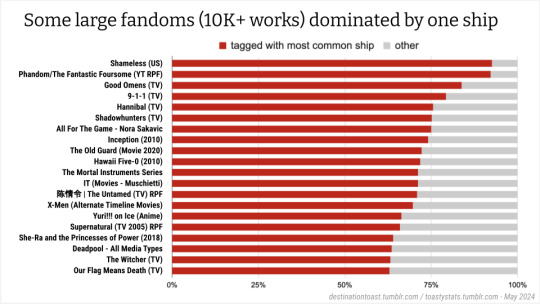
The raw data used to make this graph, including the corresponding biggest ships, is available in a spreadsheet here, or at the end of this post.
A few notes:
This is based on January 2024 data. Some things may have changed!
Not all these works are necessarily about these ships. Especially in the cases where the ships are canon, they may often be tagged as background ships.
There are undoubtedly many smaller AO3 fandoms that have higher percentages devoted to the top ship.
I removed some highly overlapping fandoms (e.g., Good Omens book fandom).
This is AO3 data only, and (as always!) AO3 does not represent fandom overall. In particular, ship popularity tends to vary A LOT by archive/platform. See some past cross-platform shipping comparisons from 2019 (comparing het vs. slash vs. gen on Wattpad/FFN/AO3), and 2014 (comparing popular ships from HP, SPN, and Sherlock on AO3/FFN). One highlight:
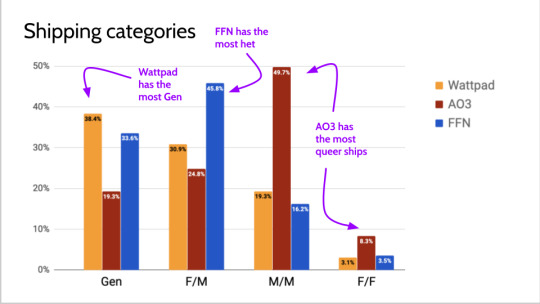
Raw data:
Fandom | Top relationship | % tagged with most common ship
Shameless (US) | Ian Gallagher/Mickey Milkovich | 92.5%
Phandom/The Fantastic Foursome (YouTube RPF) | Dan Howell/Phil Lester | 92.1%
Good Omens (TV) | Aziraphale/Crowley (Good Omens) | 83.8%
9-1-1 (TV) | Evan "Buck" Buckley/Eddie Diaz (9-1-1 TV) | 79.2%
Hannibal (TV) | Will Graham/Hannibal Lecter | 75.6%
Shadowhunters (TV) | Magnus Bane/Alec Lightwood | 75.1%
All For The Game - Nora Sakavic | Neil Josten/Andrew Minyard | 75.0%
Inception (2010) | Arthur/Eames (Inception) | 74.0%
The Old Guard (Movie 2020) | Joe | Yusuf Al-Kaysani/Nicky | Nicolò di Genova | 72.2%
Hawaii Five-0 (2010) | Steve McGarrett/Danny "Danno" Williams | 71.9%
The Mortal Instruments Series - Cassandra Clare | Magnus Bane/Alec Lightwood | 71.2%
IT (Movies - Muschietti) | Eddie Kaspbrak/Richie Tozier | 71.1%
陈情令 | The Untamed (TV) RPF | Wang Yi Bo/Xiao Zhan | Sean | 70.9%
X-Men (Alternate Timeline Movies) | Erik Lehnsherr/Charles Xavier | 69.6%
Yuri!!! on Ice (Anime) | Katsuki Yuuri/Victor Nikiforov | 66.3%
Supernatural (TV 2005) RPF | Jensen Ackles/Jared Padalecki | 66.0%
She-Ra and the Princesses of Power (2018) | Adora/Catra (She-Ra) | 63.9%
Deadpool - All Media Types | Peter Parker/Wade Wilson | 63.6%
The Witcher (TV) | Geralt z Rivii | Geralt of Rivia/Jaskier | Dandelion | 63.1%
Our Flag Means Death (TV) | Blackbeard | Edward Teach/Stede Bonnet | 63.0%
#fandom stats#toastystats#shipping#ao3#op#asks#toasty replies#I've got a backlog of other asks#that I'm hoping to find time for soon#50#100
307 notes
·
View notes
Note
About the gender in hp thing: I know JKR wrote the books wanting the patriarchy to have minimal impact on the world but even through a couple of the metas you wrote you can see that that’s not the case. In your character crying post there’s a clear implication that showing that kind of emotion is a weakness but also that it is not masculine. Equating strength with masculinity is foundational for cultures with strong patriarchies, and this idea infests every other aspect of their lives. Idk because of that and many other reasons I have a very hard time of writing the wizarding world as anything other than a patriarchy
This is a watsonian analysis vs doylist analysis issue.
I 100% do think that JKR went out of her way to really, really downplay the importance of gender in her worldbuilding - and this contributes a lot to the specific feel of the world. You could genderflip, idk. Neville. Snape. Draco. Hermione. McGonagall. and almost no plot elements or character dynamics would change. (Maybe James would bully Severus slightly differently? Idk. He honestly might not.)
Compare HP to something like His Dark Materials, another British fantasy series released at the same time, marketed to the same demographic... in which gender politics are REALLY important. Lyra conforming or not conforming to specific gender norms hugely impacts the way a lot of other characters treat her. So much of Mrs. Coulter's character has to do with how she's navigated the back ways and side avenues into power, because the patriarchy that runs *that* world is extremely explicit and plot relevant, and there's a lot she just can't do.
Now is JKR *good* at writing a gender-blind world? Not really no. So she's stripped out the importance of gender in a fairly surface way, while leaving evidence of the foundations intact. Everyone's a het couple, women take the husband's last name, Molly and Petunia are at home while their husbands work and there's no inverse of that situation, Fleur's father walks her down the aisle at her wedding, it's important that Hermione be able to tame her hair when she wants to, but for Harry it doesn't matter...
There is ALSO the narrative voice poking through and putting its own spin on everything. This is where we start getting judgment (for example) directed both at girls who are too feminine, and at girls who aren't feminine enough. Or sexual assault not really "sticking" if it's directed at boys. We don't have a character talking, in-universe, about how it's wrong for a woman not to want children. We just have a book where the only women who don't have kids (or take care of kids) are villains. Same thing with masculinity = strength = no crying. That's something the narrative framing / bias of the author brings to the table, but it's kept out of the mechanics of the magical world. I guess you could say Harry and Draco equate crying/fainting with weakness (but not explicitly anti-masculinity)... but then Lupin goes out of his way to separate 'fainting' from 'weakness' anyway.
Interestingly, gender is much more baked into the muggle worldbuilding. (Part of why I think leaving that aspect out of the wizarding world was a deliberate choice.) Smeltings is an all-boys school, so is St Brutus.' Dudley teases Harry about his "boyfriend" Cedric, Vernon sizes up Arthur and Mad-Eye by how masculine they are. At the beginning of Book 4, Dudley's diet is this very gendered conflict between Vernon and Petunia, where Vernon doesn't want a "little nancy boy for a son" - and that is one of the only truly gendered insults in the whole series. "Crybaby" almost counts... but the Slytherins tease Hermione for crying too, so idk. They tend to go for pretty gender-neutral insults, like "poor" "unimportant parents" "looks like a chipmunk" ... etc.
Like... I'm trying to imagine a scene were Lucius lays into Draco for not being masculine enough, and I can't. I think that in a canon-compliant fic, a scene like that would feel odd. The conflict would need to be framed more like a "you disgrace the name of Malfoy with your weakness" or "never tell anyone outside the family what you're thinking" or "your believe yourself to be more intelligent than you truly are." Not "you need to man up."
115 notes
·
View notes
Text
Happy birthday to Severus Snape - a character that has influenced some of the most artful and in-depth analysis of HP canon and even fanon. Happy birthday to the man whom both Dumbledore and Voldemort respected despite his more than humble upbringing and was one of the most important people in bringing the ultimate defeat of the Dark Lord. Here's to the mean, old, duplicitous, brave character that has inspired so many 🥂

58 notes
·
View notes
Text
Kwon and Draco Malfoy's character archetype and why it makes fans go crazy
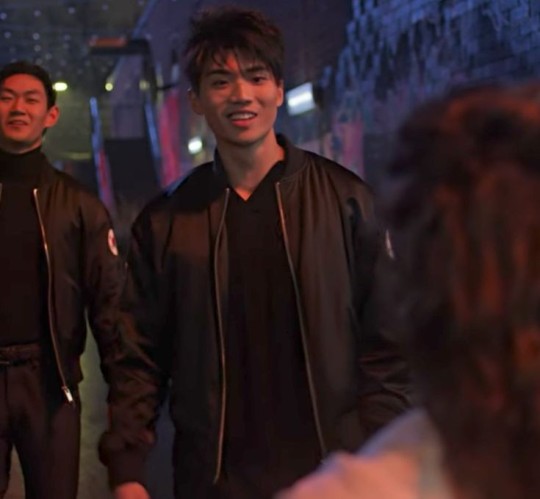
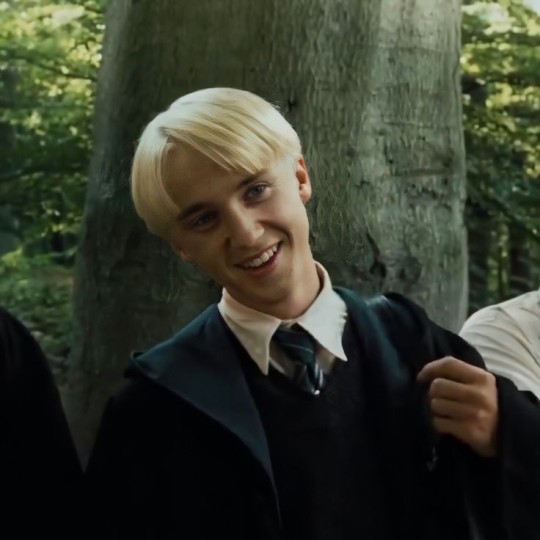
(Warning: this post contains spoilers from both stories)
Like it or not, Kwon Jae Sung has become one of the most beloved characters in the Cobra Kai series, and he only needed 15 minutes or less of screen time to do so. Here's my analysis of why his character traits are so interesting to many fans and how this reminds me of the "Draco Malfoy effect" in the Harry Potter fandom.
Cobra Kai and Death Eaters
The first time we see Kwon, he's a student at the Korean Cobra Kai dojo, a place that not only condones but actually encourages young people to be violent, offensive, and merciless. We see how this teenager eagerly absorbs every one of these teachings and puts them into action.
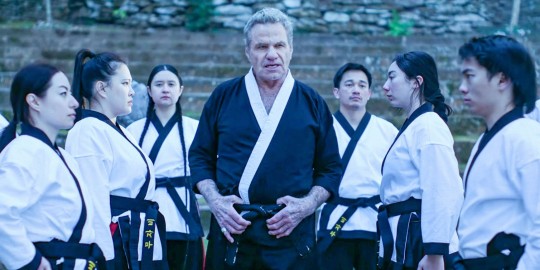
Sounds familiar? In the HP universe, Death Eaters were an elite group created for the sole purpose of terrorizing and eliminating those they considered "the weakest and unworthiest": Muggle-borns and Muggles. They convinced (or forced) very young people to join them in their "mission": Draco, Snape, Regulus… All victims who then became perpetrators of the same crimes.
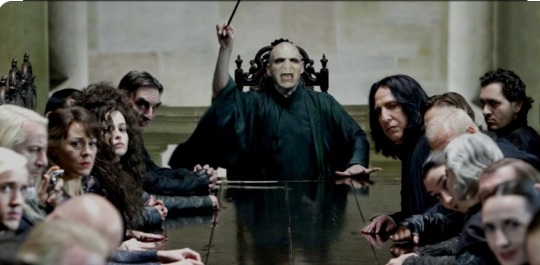
This scenario is SO attractive from a fictional POV. You have this dark group of adults that use and manipulate these teenagers or young adults for their own selfish purposes, and you begin to wonder: what are these young characters going to do when faced with the real consequences of their actions and way of thinking?
Draco realized (slowly and painfully) how his family's ideals were turning him into a monster forced to torture and kill innocent people. Kwon wasn't given enough time to do that… But I'll talk about this later.
Bad Boy trope and the King of Ships
Now, we can't deny that a huge part of both Kwon and Draco's attractiveness stems from their charisma, quick-witted remarks, and their inflated sense of self-importance, believing themselves untouchable and incomparable. They feel empowered to say and do whatever they want, whenever they want, to whomever they want.
All this, combined with their appealing and recognizable looks, creates the perfect formula for your next fictional Bad Boy crush™. And it also makes them so easy to ship with other characters, especially if their interactions can be interpreted as flirtatious when taken out of context (ahem, Dramione, ahem, Drarry, ahem, Kwon x Tory).
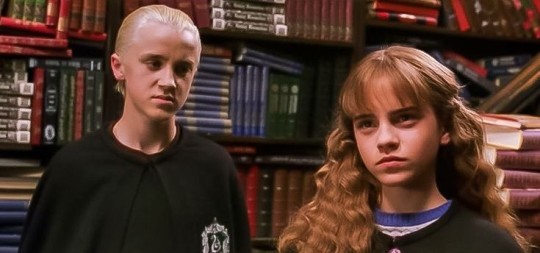
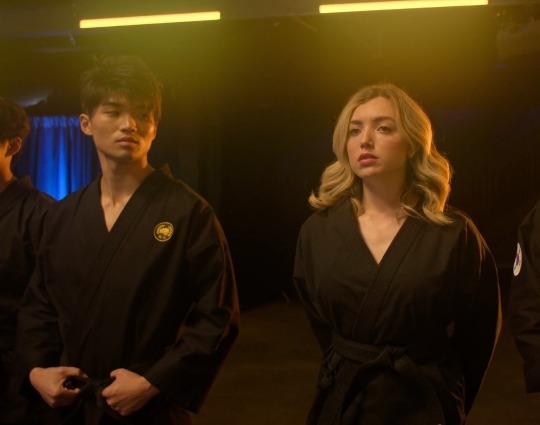
"He's just a boy"
At the end of the day, both boys were just that: 17-year-old boys trying to fit into the world they were raised in, be the best in their class, and achieve great things in life. And this is what makes them so endearing to many fans like me.
Both tried to impress the father figure they kind of idolized.
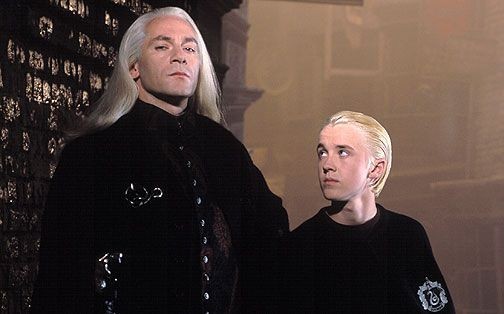
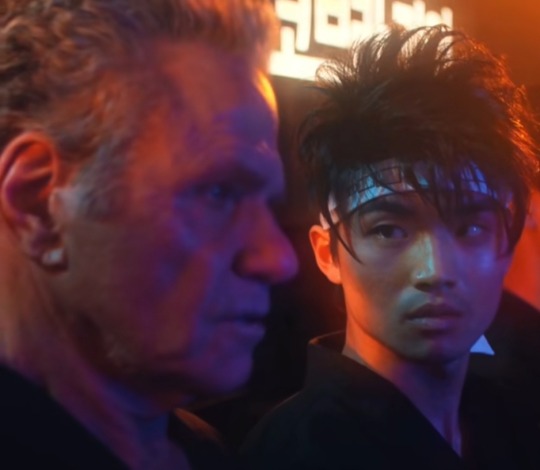
And both suffered when they faced the reality that they were just as powerless and insecure as any other normal teenager.
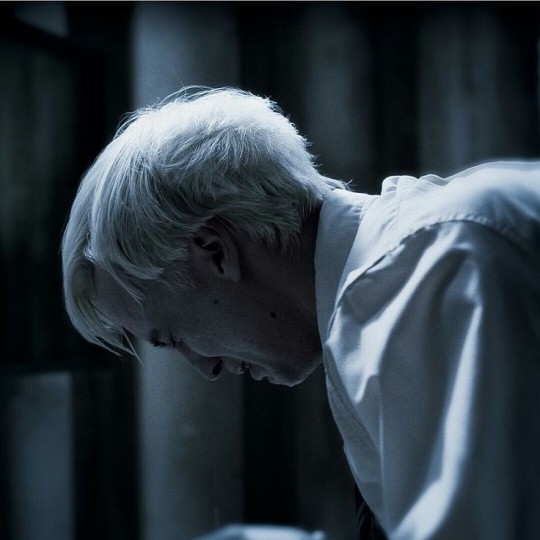
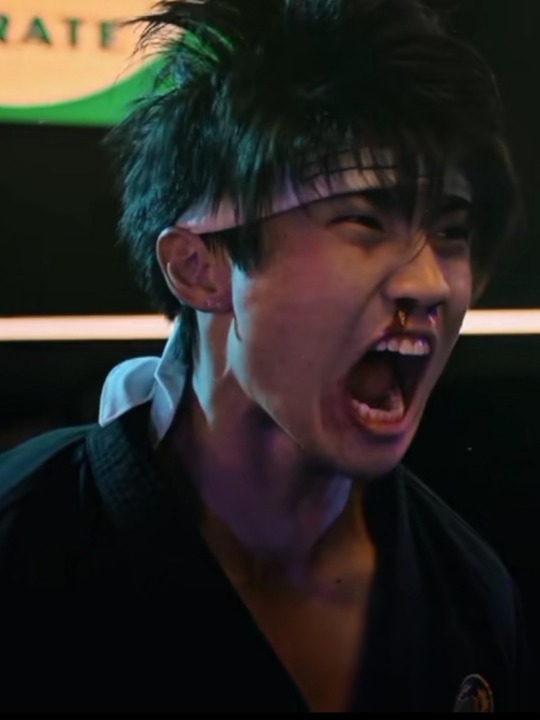
But in Draco's case, this moment of realization became the start of his regrets and redemption arc.
In Kwon's case, he was fated to be consumed by rage and die… due to a questionable plot and chain of events.
Now, I'm not going to debate the last 15 minutes of Cobra Kai Part 2 here. I've already written about it, and this isn't the point of this analysis anyway. I respect the people who think that Kwon's death was necessary and that it will help other characters' growth in Part 3, even though I strongly disagree with how the Cobra Kai writers handled it all.
However...
The infinite possibilites of the Redemption Arc
Not giving Kwon the possibility of a future redemption arc was a real waste of his character's potential.
Draco Malfoy wasn't truly redeemed in the original books, but at least in the epilogue, we see him raising a beautiful family, far removed from his racist past. And if you consider what happens in Cursed Child canon, you'll see how much he has grown and how good he could have been as a teen, too, if he hadn't been fed the wrong ideas and morals.
Imagine how cool it would have been if the "There's no such thing as bad student, only bad teacher" theme was applied in a drastically different way than what they decided to do in Part 2.
I'm not saying they should have shown us Kwon's redemption arc in Cobra Kai Season 6. That wouldn't have been good because we only have five episodes left, and it wouldn't have been believable that he changed so fast... But if he hadn't died, then all possibilities were open (for future spin-offs or even just to be coherent with the tone the CK series had until season 6, that is: no dead kids, just adults and only because of an illness).
Sunshine Actors
Lastly, it can't be denied that Brandon H. Lee and Tom Felton have played a crucial part in making their characters fan favorites.
They both have amazing acting skills, portraying charismatic yet tragic characters. And Brandon's stunt and martial arts skills are truly fascinating to watch.
But there's even more to their casting as Kwon and Draco. And even though I can totally separate the actor from the character, I won't deny that the actors being handsome, gentlemen, and the nicest people behind the scenes plays an important part in fans loving their characters.
If you've made it this far, thank you so much for reading!
I often post more character analyses and plot reviews, so if you like this, feel free to follow me and message me with any questions you may have :)
~miriadalia
#cobra kai#cobra kai season 6#cobra kai part 2#kwon jae sung#tory nichols#cobra kai kwon#cobra kai series#ck spoilers#kwon cobra kai#draco malfoy#draco lucius malfoy#harry potter#hp fandom#harry potter fandom#harry potter analysis#cobra kai analysis#character analysis#just my opinion#writing characters#bad boys#writing#writers on tumblr#writers community#netflix#netflix series#netflix shows#jk rowling#dramione#draco x hermione#tory x kwon
46 notes
·
View notes
Note
Let me start by saying that I adore your meta. It's some of the most thorough, well-reasoned hp analysis I've come across & you have a talent for tenderly mining and polishing canon connections I've never considered. You've put into words so many of my feelings about drarry, hinny, and the characters as a whole -- why I love them, why I struggle with them, and why they still compel me after all these years. I'm slowly chipping away at your blog and won't stop until I get to page 1 I've found myself very taken with the Slytherins lately--especially characters like Millicent and Daphne, who are either offhand names or caricatures, as well as some of the older Slytherins we see mentioned, who seem to stay largely out of the war (or at least aren't important enough to it for a mention). There are a lot of widely accepted fanon personalities/interpersonal dynamics for the Slytherins, and they're always fun to delve into. But I often find myself struggling to separate canon from fanon. Do you have any thoughts on what we can extrapolate about the Slytherins in canon (apart from "mean, ugly, & stupid/vapid" as jkr describes nearly every Slytherin but Draco)? And if not, do you have any blogs/posts to recommend on the topic?
Wow. What can I even say. I've been staring at this ask since I received it feeling so warmed by your words. Thank you very much for such high compliments. It always thrills me to hear that people get some enjoyment/mental stimulation out of this blog and that my little ramblings are of interest to others.
To some extent, since the other Slytherins aren't that well developed (due to the fact that Harry was too busy constantly staring at Draco to notice anything about them - I mean he literally doesn't even know Theodore Nott's NAME till he sees him spending more time with Draco) there's a lot of room for people to come up with their own interpretations of their personalities.
That said, there is some info in canon we can go off of. For example, we see Pansy hanging out with Draco a lot more than Millicent or Daphne. We also know that none of their parents were Death Eaters. And given that Millicent and Daphne seem to stay away from Draco more later, maybe their families aren't quite as into the whole blood purist stuff as Pansy and her family are. Especially Daphne does not seem to really participate in any of the bullying we see a lot of the Slytherins take part in.
Personally, I always headcannoned that Daphne never liked Draco very much and that while she did hold some anti-muggle and anti-muggleborn biases (similar to those held by most of the wizarding world), her attitudes were more on the level of those held by Fudge or Crouch and she never actually went in for any of the really extremist blood purist beliefs or supported the Death Eaters or even had attitudes as extreme as Walburga Black (who thought the Death Eaters mostly had the right idea even if they went about it the wrong way). I also think she didn't much like the pettier behaviors Draco engaged in - the boasting, the bullying, the mockery, not to mention the weird Potter obsession - (or that the people Draco hung out with engaged in). I think she probably found him stuck up and arrogant and vaguely unsavory and tended to avoid him, even if she wasn't as horrified or enraged by him using slurs like Mudblood as someone like Ron or Harry would be.
I like the idea that after the war she and her sister changed their minds about their beliefs about muggles and muggleborns - even if they were never quite as extreme to begin with as those held by some. I headcanon that they two of them were both back at Hogwarts during Draco's 8th year - and that they actually ended up striking up a friendship - once the realized that he'd changed. After all, they were housemates for years. Plus they ran in similar social circles. And they all changed their minds, so that's a common bond. Daphne tells Draco point blank that she always thought he was a stuck up twat and Draco agrees that he was, which breaks the ice.
As for Pansy, I actually think she was more of a hanger on than a true friend. I think she and Draco drifted apart in 7th year. I don't especially like characterizations that whitewash the bad things she did - either the bullying or the bigotry or the "trying to hand harry in to Voldemort" thing - or that turn her into some ooc mary sue girlboss with no personality other than being a genius who is great at everything and also gets to be mean with no consequences because she's so cool so no one cares I guess. That's not to say I don't enjoy fics with Draco/Pansy friendship if it's done right. But yeah, based on actual canon I see her moving on to the next person once Draco's fortunes were shown to have irrevocably fallen by book 7. Plus it's arguable that she always expected to marry Draco since he was the best match (thru book 6 anyway) but that she always secretly harbored feelings for Blaise. And after the war she got to act on that. After all, in the train scene in book 6 she seems awfully interested in what girls Blaise likes.
For Millicent we have even less. We know she was a bully. I don't like seeing that ignored or seeing her girlbossified. I do like the idea of her going thru her own little redemption arc and trying to make something of herself. I also imagine that she and Draco kind of drifted apart though. I think she ever became a completely nice person, but I like the idea of her apologizing to Hermione and them ending up at the Ministry together and kind of tolerating each other - just one of the many instances of strange, uncomfortable relationships that pop up in the post-war wizarding society as it tries to put itself together.
As for Crabbe & Goyle, I really hate how often fandom seems to forget or gloss over the fact that both of them were actively participating in torturing other students and seemingly very into it. I think the way Draco treated them - as henchmen/servants - always grated on them but they accepted it due to the relative statuses of their families. When the power dynamic between them shifts though, starting book 6 but really post book 6, they seem to revel in Draco's degradation and fall from grace (and we even see hints of that earlier, like them laughing when Draco gets beaten up by Harry in book 5 and not intervening). I find that super fascinating, and I think they are darker, more twisted characters than people tend to give them credit for. Given all this, I don't see Draco and Goyle staying friends post war and I never get why Goyle having been an enthusiastic participant in the Death Eaters' crimes (in a way that Draco never was) so often gets forgotten. Usually post war he gets reduced to a simple minded sad boi who Draco needs to look after. And I'm just like ??? Where?? Especially given that the alternative provides so much more interesting story fodder.
#asks#Harry Potter#Harry Potter meta#Millicent Bulstrode#Draco Malfoy#Pansy Parkinson#Gregory Goyle#Daphne Greengrass#Slytherins#Slytherin#my meta
35 notes
·
View notes
Text
IDK if this little section of the internet is just uncharacteristically hateful and negative and miserable lately or what. I've been lurking for like a year and posting since like 2 months ago, and it seems recent. I don't really feel like inserting myself into it anymore because it's not fun.
I loved HP as a kid probably like 9-12 y/o, at which time I picked up on something between Bellatrix & Voldemort due to the be quiet, Bella and the no higher pleasure lines. I reread the series for the first time as an adult in Oct-Nov 2023, and I was astonished at how much more I am able to pull from this text now. I came away with a much greater understanding of several things I'd missed as a kid. One of these is that it was very clear to me that Bellatrix & Voldemort were written to be at least sleeping together. VERY CLEAR. It was AFTER this point that I started being part of the fandom, and way after that I've seen people claiming their relationship ISN'T in the books. To me, this is really surprising, because when I've read the books as an adult, it's quite clear. Once I got into the fandom, I found that there are a huge number of people that agree with this interpretation of the text and find is equally obvious as I do.
However, despite the fact that I've seen a number of claims that they DON'T have any relationship in the books, I don't see people using text evidence to support this interpretation. In my personal opinion, this is probably because this is a very difficult argument to make based on the text. But if you think it can be done, instead of submitting negative anon messages without any text support, why don't you write a meta? If anyone would like to make a post going through all of the things people say are text evidence for Bellatrix/Voldemort and explaining why they're not the case, I would gladly read that out of genuine interest. Or, simply going through all the excerpts on their interpersonal relationship and explaining based on the text what sort of relationship you think they DO have.
I have seen countless people over the years analyze sections of text, lines between different characters, their attitudes toward each other, their various actions, and so on, and explain why this adds up to Bellatrix & Voldemort having some sort of relationship. I have NEVER yet seen someone who DOESN'T believe they had a relationship write a text analysis of their opinion. So I sincerely invite you to go through all the bits of text that Bellamort shippers say are canon evidence and explain why they're not—in individual instances and in total. Explain why = not just 'this is my alternative interpretation without text analysis' but *how you justify this being the case based on the text*. How do you justify ignoring how countless bits of the text can be interpreted all in this one way (Bellamort) and instead interpreting them all different ways? How do you explain what JKR was intending to say about Bellatrix & Voldemort's interpersonal relationship considering all their interactions both on- & off-page? WHY are they written the way they are if they don't have an intimate relationship? Or if you believe they're not written that way, again how can you justify this based on the text? If you need a list of text moments and existing 'Bellamort is canon' metas I can compile one.
I'm curious to see what you come up with, because I've never once seen this done—and because, as I've said, it's not an opinion that I personally believe to be supported by the text. If you can explain why it is supported by the text please do that and I'll consume it in good faith.
#considering I'm pretty sure the bulk of this negativity is one person consider this addressed directly to you my friend#bellamort
44 notes
·
View notes
Text
some gus headcanons
we all know gus is an english nerd, with the spellingg bee episode and how much he corrects shawn with grammer. however i propose: he obsesses over literary analysis because of the Autism™️. he wants to be able to tell what people are thinking in real life that they dont directly say. does this work? who knows. not me
he DEFINITELY owns a train model of some sort. its probably in the psych office
he has a stupidly complicated fake-drawer thing in his desk, in which is a lock-picking set to hone his skillz. shawn has stolen it multiple times to break into places and gus has no idea
instead of harry potter (i shudder even typing the name) he obsesses over wings of fire. bc fuck you thats why (dragons r cool) (hp is not)
he carries around those icebreaker mint things literally everywhere. maybe its in his sample case or smth
okay so his special interests are: trains, wof, safe- and lock-picking, english, autism, and dinosaurs. he is fully aware that most of these are 'stereotypical' autism interests, and sometimes he feels bad about it. and then he remembers that No One Else Matters and everythings good again
his relationship with shawn is the kind where he just feels more and more happy being with him and never realizes that hes in love with shawn. this is the only reason canon shawngus didnt happen/j
86 notes
·
View notes
Text
Counter argument(s):
Tom and Dumbledore only are seen to interact in canon twice (the books, not the movies). Once at the orphanage, once at the job interview (after he’s made a ton of Horcruxes and started doing Death Eater stuff). We just don’t have enough information to conclude anything about their relationship. Dumbledore was perhaps not super nicey to Tom when they first met, but not telling the other professors about the rabbit and cave incidents suggests he hoped to turn over a new leaf (Dumbledore actually says as much). He might come off as judgy when describing Tom in HBP but he's also telling Harry about Tom in hindsight.
People also blame Dumbledore for sending Tom back into the Blitz, but (1) the Blitz was during Sept 1940-May 1941 so it happened while Tom was at Hogwarts and (2) it's Dippet who refuses to let him stay over the summer, not Dumbledore (in the books).
On the subject of Dippet, he literally mistakes Tom as Muggle-born (the latter corrects him), suggesting that a lot of people might also believe this. If anything, Tom probably gets the most grief from his pureblood Slytherin housemates (before he can prove his Gaunt parentage, at least) especially given Grindelwald has probably whipped them into a frenzy.
Additionally, we can’t really blame Tom Sr, a literal rape victim, for noping the fuck out and ‘abandoning’ Merope after being drugged and kidnapped. It might look like abandonment on the Riddle’s side from Tom’s perspective, but it’s not.
If any character is at fault for the rise of Voldemort, it’s Merope. Yeah Tom's tragic backstory explains why he's not the Nicest Guy and his fear of dying and all that jazz but not the World Takeover, Cult Leader, and Killing People things. Also it's just more boring when Tom has no character agency.
Friendly reminder that Tom Riddle didn’t create Voldemort. Dumbledore created Voldemort.
Tom was raised in a Religious Orphanage in the 30s and 40s. He was not treated nicely by anyone. Of course he would be vindictive and hate Non-Magicals.
Dumbledore on the other hand decided that an eleven-year-old was the anti-Christ and treated him like he was already a mass-murderer.
Tom was in the Orphanage in London when the bombs fell. Of course he would be terrified of dying. He was abandoned by his only living relatives. Of course he’d wish them dead.
Dumbledore looked at a child and saw a demon. If he had seen a child, Voldemort would never have existed.
Give me arguments if you disagree.
#tom riddle#lord voldemort#woobification#lord voldemort is tom riddle's terrible coping mechanism say it with me#with dumbledore's own dark past he'd probably be more sympathetic towards budding dark lords#i know the britain in wwii = blitz connection is in all of our minds#i even adjusted the timeline for a fic#but historically/canonically it didn't coincide#hp meta#character analysis
447 notes
·
View notes
Note
OK, so we all kinda joke about that "monster." In Harry Stomach, That jkr writes about to describe Harry's "Jealousy" when he sees Ginny kissing Dean (literally wanting to rip Dean's Throat out or something along the lines.)
(It's been a hot second since I've read that part.)
which I find interesting because I used to headcannon Harry as being bi, but ever since I read (hollowed-theory-hall) article on his Sexuality I can only ever see him as gay...headcanon what ever you want though Obviously.
(I highly recommend checking them out. I asked them the same question as I'm asking you)
But like it's also described as "swelling with pride" or "wanting to puff out its chest" or "Curling up in his stomach and purring in Content/Satisfaction"
Like, jkr be so fucking for real wtf 😐
BBUUUUUUTTT, hear me out......Dormant creature gene?
Like you can't tell me that it doesn't read as instincts or some shit without or even with context, or you can tell me it doesn't read that way. Your opinion is valid and something I value.
And if you are inclined to indulge me. What sort of creature gene do you believe he would have?
Dark fae? cù-sìth? Harpy? cat-sìth? Maybe Lord Moldy-Voldy gave Harry some varey mild Naga genes along with parseltongue.
Who "knows"..he...get it?..like "nose".....i'll see myself out now..🏃♀️➡️...like his nose....lol
Anyway, sorry for making this so long. Have a lovely day, stay safe and drink some water🥰
Interesting question! Okay, so disclaimer that creature fics aren’t really my thing, so I don’t personally head canon Harry this way. HOWEVER, what I am a big fan of is taking something that was OBVIOUSLY meant to be metaphorical--something where EVERYONE is going to be interpreting it metaphorically--and being like okay but what if it was literal and then doing a whole analysis on that. So, yeah, I’ll play along.
Ah, the infamous chest monster! What the hell was that, anyway?? Well… okay, so I was thinking the fact that, as you mentioned, the creature focuses on pride, jealousy, and possessiveness (and not, I might note, actual attraction or love) suggests that it would be a creature that was also associated with these emotions.
Now, like I said, I don’t really know creature stuff all that well, but when I originally read the books, I read the chest monster as kind of dragon-coded. You know, “roaring in triumph” and all that stuff. And dragons are associated with hoarding/possessiveness, so there’s that. We also know that Harry fought a Hungarian Horntail, the most dangerous dragon there is, when he was 14 and lived to tell the tale, which is pretty badass. BUT, at least in HP, I don’t know of any humans who take dragon-creature forms.
THEN I got to thinking, okay, what about another type of magical reptile? Specifically, a Basilisk. Now, we don’t know about human-Basilisk creatures, either, BUT there probably isn’t anyone (or hardly anyone) besides Harry that was bitten by a Basilisk and survived. I think Basilisks are pretty rare, anyway, seeing as breeding them basically requires human intervention (hatching a chicken egg under a toad) and was outlawed in medieval times. So, it’s reasonable to suppose that Basilisks have some traits that aren’t very well known.
Now, we know Harry has a piece of Voldemort’s soul in him, which also makes him magically unique. He is the only known human horcrux. And who created horcruxes? Herpo the Foul. And what else did Herpo the Foul create? The first Basilisk. Salazar Slytherin later used Herpo’s method to create Slytherin’s monster for the Chamber… And Voldemort later used Herpo’s method to create his horcruxes. We also know Tom/Voldemort is the Heir of Slytherin and thus the rightful master of the Basilisk in the Chamber. Which is also the Basilisk that bit Harry, of course.
So… what if Harry, as Voldemort’s horcrux, has something in him that was activated by the Basilisk venom? Thus, the “creature” kind of reflects Tom’s personality in a sort of primal way. It’s jealous, possessive, and prideful.
So why Ginny? (Particularly if you view Harry as gay -- personally I put him at about a Kinsey 5, but that's another post). Well… this is where it gets tricky. At the time when the Basilisk bit Harry, Tom had been possessing Ginny for almost a year, she opened the Chamber, etc. She also told Tom allllll about her crush on Harry and cemented herself as a potential mating rival.
The Basilisk-creature is jealous and possessive. But it doesn’t have agency on its own. So it drives Harry's jealousy to pull Ginny in. And then, if they actually have sex, it injects her with the Basilisk venom that lives in Harry’s body, and she dies. Probably anyone except the rightful master of Slytherin’s monster who has sex with Harry dies.
The End.
Ahhhhh so yeah, I wasn’t even trying to, but apparently everything I touch turns to Dark Tomarrymort… 💀💀 Sorry (not sorry)
#well that escalated quickly#answered asks#creature harry#weird what if ramblings#i regret maybe not everything but some things
17 notes
·
View notes